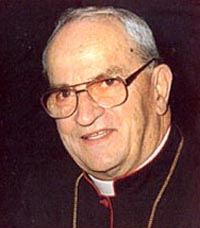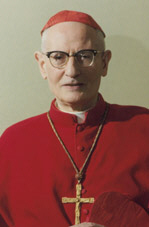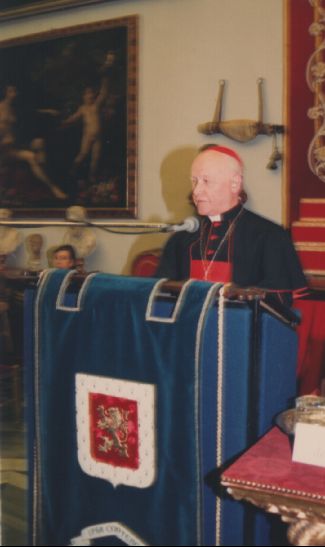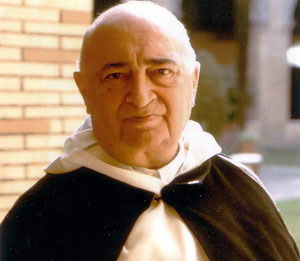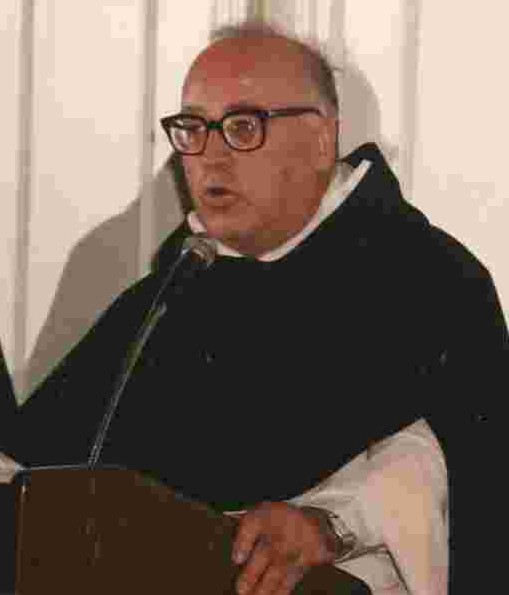|
Internationally renowned personages praise Nobility and Analogous Traditional Elites in the Allocutions of Pius XII A Theme Illuminating American Social History
|
|
|
From Cardinal Silvio Oddi to Prof. Plinio Corrêa de Oliveira Rome, February 10, 1993 Distinguished Professor, It was with keen interest that I read your work "Nobility and Analogous Traditional Elites in the Allocutions of Pius XII to the Roman Patriciate and Nobility.'' The thought of the great Pope Pacelli, as shown in the documents mentioned, remains entirely relevant and you have taken the good initiative of presenting it to today's public along with opportune annotations. It is useful to remind people, as Paul VI himself did after the Second Vatican Council, that the teachings his predecessor addressed to the Roman Patriciate and Nobility continue to be fully valid. In the comments and documentation with which you facilitate a more complete understanding of the full range of Pius XII's magisterium, one can see great erudition and sureness of thought, justly highlighted by the well-known French historian Georges Bordonove in his preface to [the French edition of] this work. I am certain that I am performing a good deed by recommending your book to all who wish to deepen their knowledge of the wise and enlightening teachings of that pontiff. Hoping your timely book will have a wide circulation, I send you cordial greetings. Silvio Card. Oddi (Translation from the Italian original)
Biographical data of His Eminence Cardinal Oddi Cardinal Silvio Oddi was born in Morfasso, in the province of Piacenza, Italy, in 1910. Having completed his studies at the Angelicum of Rome, he entered the Pontifical Ecclesiastical Academy. At the service of the Secretariat of State, the still very young Father Oddi began a brilliant career in Vatican diplomacy. Cardinal Oddi speaks several languages and is one of the best informed ecclesiastics on the Middle East, where he held diplomatic posts in several countries. On behalf of the Holy See, he also undertook very delicate missions in Yugoslavia and Cuba immediately after the accession of the communist regime. In 1969, while Apostolic Nuncio in Belgium, he received the news of his elevation to the cardinalate, with the title of Sant'Agata in Urbe. Since then, he has resided in Rome, holding high offices in the Vatican Curia. In 1979, John Paul II made him Prefect of the Sacred Congregation for the Clergy, a position he held until 1985. He is presently Pontifical Legate for the Sanctuary of Saint Francis of Assisi. Cardinal Oddi, an expert on life in the Vatican, of which he has been a protagonist in the last decades, is often interviewed by the Italian and international press on the situation of the Church in our days. * * * From Cardinal Mario Luigi Ciappi, O.P., to Prof. Plinio Corrêa de Oliveira Rome, February 18, 1993 Distinguished Professor, Your great renown and the words of praise and encouragement given for your work by the illustrious Fr. Victorino Rodríguez, O.P., generally considered one of the glories of contemporary theology, have led me to read with lively interest your book “Nobility and Analogous Traditional Elites in the Allocutions of Pius XII to the Roman Patriciate and Nobility.'' When Pius XII gave the world the splendid series of fourteen allocutions to the Roman Patriciate and Nobility, there were many who saw them less as a theological, philosophical, and historical work regarding values destined to yet play a fundamental and timeless role, than as a nostalgic effusion of love for virtues, greatnesses, and glories that the world understood less and less. The most recent of the abovementioned allocutions was that of 1958. More than thirty years later, we can now see how wrong the latter were. Indeed, Pope Pacelli had seen the course of events correctly. Today, not only is the old hostility to the nobility gradually dying out, but there are prominent intellectuals emerging most everywhere who emphasize how detrimental is the loss of authentic elites--with the concomitant vulgarization of the human type--to culture and to the lifestyle of contemporary society. This is why in many places we now see manifested an ardent aspiration for the restoration of the influence of authentic elites over the multitudes, so that the latter may once again become--in accordance with Pius XII's teachings--peoples instead of nameless masses (cf. Christmas radio message of His Holiness Pius XII, 1944). In this historical context, your work proves to be extraordinarily timely, since in echoing the magisterium of Pope Pacelli and commenting on it with such notable penetration and consistency, it makes an appeal to the nobility and the analogous elites to contribute, with more courage than ever before, toward the common spiritual and temporal good of all nations. Indeed it falls to them, as that immortal Pope underscored, to fulfill the precious mission of communicating by example, word, and action the treasure of religious and temporal truths of Christianity, the luminous torch of so many truths that societies can never forget without the risk of succumbing to the vortex of chaos and moral misery that threatens them. I therefore hope for the best of receptions for your book, to which you have devoted the vast resources of your intelligence and erudition, besides your unlimited love for the Church. May it please Divine Providence to grant it widespread circulation, so that both the preferential option for the nobles, inspired by Pius XII and highlighted by you, and the preferential option for the poor, to whom the current Pontiff has devoted his ardent love, will be forever better understood. Mario Luigi Card. Ciappi, O.P. (Translation from the Italian original)
Biographical data of His Eminence Cardinal Ciappi Cardinal Mario Luigi Ciappi, O.P., was born in Florence on October 6, 1909, and was ordained a priest on March 26, 1932. For many years he was a professor at the Angelicum, where he taught Moral and Dogmatic Theology and Mariology. Among his students was the then Father Karol Wojtyla, later His Holiness John Paul II. Cardinal Ciappi became the dean of the Faculty of Theology at this athenaeum. He was elevated to the episcopal dignity as titular of the Church of Miseno on June 10, 1977, and, in the Consistory of June 27 of the same year, he received the cardinal's hat from the hands of Paul VI with the title of the Sacred Heart of Jesus Agonizing in Vitinia. Until 1989 he was theologian of the Pontifical Household, that is, private theologian of the Holy Father. Cardinal Ciappi is currently president of the Pontifical Roman Academy of Saint Thomas Aquinas and of Catholic Religion, which gathers some of the greatest names in contemporary theology.
From Cardinal Alfons M. Stickler, SDB, to Prof. Plinio Corrêa de Oliveira Vatican City, Feast of Saint Joseph, 1993 Most illustrious Professor, I thank you heartily for the kind gift of your work “Nobility and Analogous Traditional Elites in the Allocutions of Pius XII to the Roman Patriciate and Nobility,'' sent to me in its Italian translation. It made a deep impression on me for several reasons: first of all, for its timeliness, in that it is the reaffirmation of the teachings of the great Pope Pacelli on the subject at a historical-cultural moment when ferocious hostility to the nobility, spread all over the world by the French Revolution, seems everywhere to be diminishing. Secondly, the work--amid the universal decay of natural and, above all, Christian values--will awaken in many hearts everywhere the desire to see nobiliary elites, who in past centuries played an important and often decisive role in upholding these values through their lives and actions, once again setting for humanity the examples it so urgently and supremely needs. A third reason derives from your observations--which seem to me extremely relevant--regarding the formation, alongside the nobilities and elites of blood, of nobilities and elites of spirit and mind that, by associating and organizing among the many noble souls that exist, are assuming all over the world the roles of exemplars and guides toward a natural and perennial order of things, whether to support the nobilities of blood still in existence and now re-emerging, or to replace those no longer capable of reacting efficaciously to the decadence manifested in our days, as has happened in more than one instance. Using a vast and solid documentation, you have done a fine analysis of the very complex sociopolitical reality of our day, and commenting with great logical rigor on the luminous teachings of Pope Pacelli, you show how much he and his successors up to John Paul II continue to expect from the still existing nobility and future analogous elites for the religious, moral, and cultural uplifting of the world. I therefore rejoice at this book, illustrious Professor, and wish it a broad circulation, so it may spark, sustain, and build a deep and vast sensitivity to this excellent tool for the re-creation of a sound natural ethics and a revived religious morality that may lead all humanity to that peace, prosperity, and happiness that only authentic and genuine values can realize and guarantee. To these good wishes I add my fervent prayers to the Lord and to the Mother of the Church, that they may sustain you in the work which is both beneficent and painfully pressing in the times in which we live. Yours in Christ, Alfons M. Card. Stickler SDB (Translation from the Italian original)
Biographical data of His Eminence Cardinal Stickler Cardinal Alfons M. Stickler, SDB, was born in Neunkirchen, Austria, in 1910. While still young he entered the Salesian Congregation and made his first studies of Philosophy and Theology in Austria and Germany, later specializing in Canon Law at the Roman schools of San Apollinare and Lateranense. His particular vocation to the study of juridical sciences led him to teach at the Pontifical Salesian Athenaeum, first in Turin and later in Rome. Father Stickler became dean of the Canon Law School and then rector of the Athenaeum, an office he held from 1958 to 1966. Placing his superior academic talents at the service of the Holy See, Father Stickler, after having directed the Pontifical Institute of Higher Latin Studies, was named Prefect of the Vatican Library, an institution unequalled in the world on account of its bibliographic treasures. In 1983 John Paul II elevated him to the episcopal dignity and made him Pro-Librarian. Afterward, upon making him a cardinal, he appointed him Librarian and Archivist of the Holy Roman Church, an office that since its creation in the sixteenth century has been exercised by great ecclesiastical figures. Cardinal Stickler held this office until 1988. More noted among his important responsibilities is his participation in the Commission responsible for elaborating the new Code of Canon Law.
From a renowned Italian theologian to Prof. Plinio Corrêa de Oliveira Distinguished Professor, I have attentively read your work “The Nobility and Analogous Traditional Elites in the Allocutions of Pius XII to the Roman Patriciate and Nobility,'' which you were so kind to send to me. I most happily agree with your idea of giving wide diffusion to those documents of Pius XII, which at first glance might seem devoid of relevance to the present day. In fact, however, your lucid and documented commentaries show the far-sightedness of the theme discussed by that Pontiff. Furthermore, you opportunely recall the beautiful words of Paul VI: “We would like to say many things to you. Your presence provokes much reflection. So it was also with Our venerable Predecessors, especially Pope Pius XII of happy memory.... We want to believe that the echo of those words, like a gust of wind swelling a sail,...still vibrates in your thoughts, filling them with the austere and magnanimous appeals that nourish the vocation preordained for you by Providence and sustain the role still required of you today by contemporary society.'' Your long experience as professor, congressman, and public man make your commentaries all the more intelligent and instructive, pleasantly facilitating the reading of the Pontifical Documents, which are of such lofty and estimable value. I did not find in your pages any error of a theological or other nature regarding the teachings of the Church. I can only hope that your excellent work will be given a warm and full reception by the public for whom it is intended. Fr. Raimondo Spiazzi, O.P. (Translation from the Italian original)
Biographical data of the Rev. Fr. Spiazzi, O.P. Fr. Raimondo Spiazzi, O.P., was born in Moneglia, in the province of Liguria, Italy, in 1918. He was ordained a priest in 1944 and obtained, three years later, a doctorate in Sacred Theology at the Angelicum of Rome. He began his long career as university professor teaching Fundamental Theology, Moral Philosophy, and Sociology at the Studio Domenicano of Turin and Dogmatic Theology at the Centro Cattolico di Cultura of the same city. In 1949 he returned to Rome, where he lectured, first at the University Pro Deo and then at the Angelicum. He founded this athenaeum's School of Social Sciences. In 1954 he was appointed dean of the Institute of Religious Sciences at the Angelicum. In 1957 he began to teach Pastoral Theology at the Pontifical Lateran University, and, in 1967, Dogmatic Theology at the Center of Theology for the Laity of the Vicariat of Rome, becoming its dean in 1987. Father Spiazzi exercised the office of Apostolic Visitor to the seminaries in Lombardy and Milan and of Provincial of the Dominican Order for Piedmont and Liguria. Paul VI personally nominated him specialist of the Second Vatican Council. He is now consultant to the Congregation for Catholic Education and member of several study commissions of the Vatican congregations and the Vicariat of Rome. He also belongs to the Pontifical Academy of the Immaculate, the Pontifical Roman Academy of Theology, the Pontifical Academy of Saint Thomas Aquinas, and is the rector of the Basilica of San Sisto Vecchio on the Appian Way. Father Spiazzi has published 2,500 books and articles. The latter are often divulged by Italian and foreign magazines.
From one of the great contemporary theologians to Prof. Plinio Corrêa de Oliveira Madrid, January 25, 1993 Dear friend and admired Professor, I have read closely the original of your magnificent work "Nobility and Analogous Traditional Elites in the Allocutions of Pius XII to the Roman Patriciate and Nobility,'' which you were kind enough to send me for review. I am greatly honored by your confidence in my evaluation and possible comments. In addition, I admire your ardent desire to be well founded when launching so noble a cause, as well as your humility in requesting the opinion of someone far less knowledgeable than you about the subject, both in its doctrinal and historical dimensions. I must say that I found absolutely nothing to criticize or even to improve in your undertaking. I would, however, like to highlight what I consider very good: First, the very writing of a book on this subject. It was needed; and your selection of a starting point and major basis for discussion could not have been better: the successive New Year allocutions of Pius XII to the Roman Patriciate and Nobility. This exceptional Pope Pacelli, whose mind, heart, and blood were noble, was singularly attentive to the problems and expectations of his times. Thus, he could not help but be concerned with the problems of the nobility, to whom he addressed these allocutions, now opportunely brought to us by a Brazilian noble, whose personality is so marked by devotion to the Apostolic See and respect for Christian Civilization. Second, the timeliness, since the genuine values of the nobility are currently eclipsed in the post-revolutionary "egalitarianism" and the inorganic modern democracies. More notoriety ("nobile" = "noscibilie," distinguished, excellent, famous) is given to numbers (of votes or dollars) than to qualities that bring dignity (knowledge, virtue, art). Yet, as I heard the great theologian Santiago Ramirez say on several occasions, "truth is not democratic, but aristocratic." I hope that your carefully documented, thoughtful work will bring the traditional nobility to the forefront, as bearer of dignity, honesty, and humanism open to God and to the social common good. Third, I think that the harmonic complementarity you establish between the "preferential option for the poor," so accentuated in the new evangelization, and the "preferential option for the nobility" is very just and Christian. Indeed, these two outlooks are not exclusive, but complementary. I believe this is the key: One should love the best more, and help the neediest more. Hence the two harmonized preferential options. The charitable option for the indigent should not diminish the singular esteem deserved by the nobility, especially when such esteem is at a low ebb in times of widespread egalitarianism. Very much to the point is the information on the high percentage of canonized saints among the nobility. It was Pius XII who, in 1943, canonized Saint Margaret of Hungary, O.P., daughter of the King of Hungary and grand-daughter of the Emperor of Constantinople. Fourth, in an era of "pacifism" (or peace at any cost), it is also advantageous to give thought to the topic of just war, so often waged by the nobility, whether military or civil and ecclesiastical. The Magisterium and Theology had and have much to say in this regard, as Document XI reminds us. Fifth and last, at a time when democracy, with no discernment or ulterior ethical resolution, is the sole political dogma for many, it is opportune to recall the Church's social doctrine on the forms of government. The Papal Magisterium has incorporated Saint Thomas's nuanced doctrine, taken up so often by Catholic thinkers and now by you in Appendix IV of your work. I could highlight many other interesting points of your work, but do not wish to overlengthen this letter nor to repeat what the reader will find more adequately and more elaborately expounded in the book. With these remarks I hope to attest to having read the original with pleasure and to respond to your friendly gesture. Victorino Rodríguez, O.P. (Translation from Spanish original)
Biographical data of the Rev. Fr. Victorino Rodríguez Fr. Victorino Rodríguez y Rodríguez, O.P., is one of the most noted intellectual figures of Spain today. Born in Carriles, Asturias, on February 14, 1926, he joined the Order of Saint Dominic when he was 19. Ordained a priest in 1952, he travelled to Rome to complete his studies and obtain a doctorate. An eminent theologian, presently prior of the Convent of Santo Domingo el Real in Madrid, he was professor of the School of Theology of San Esteban, in Salamanca, and held a chair at the Pontifical University of the same city. He is professor of the Superior Council of Scientific Investigations, of Madrid, member of the Royal Academy of Doctors of the same city, and of the Pontifical Roman Academy of Theology. More than 250 of his books and articles have been published, many by the famous publishing house Biblioteca de Autores Cristianos of Madrid. |
|

